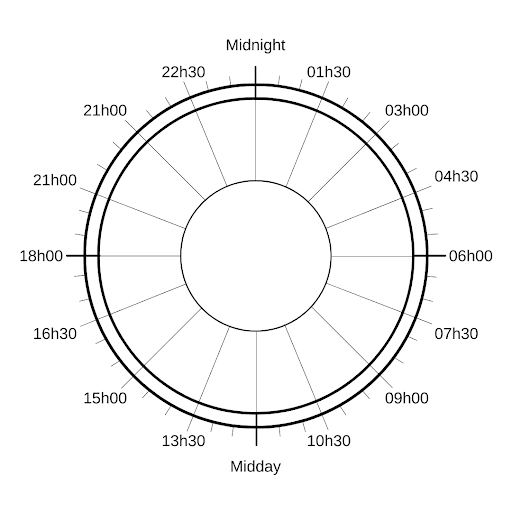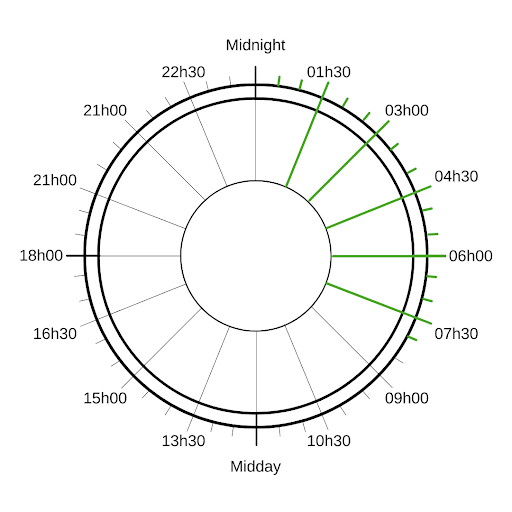Sleep your way fit!
Chart your sleep cycle
My perfect night
Use the table below to plan your perfect night. To do this, divide the time before you plan to get up into five blocks of 90 minutes each (= 5 sleep cycles). For some, four cycles offer plenty of sleep, while others will need six. Calculate your sleep time based on the five cycles and test it this week. An example is provided on page 2. How do you feel? Do you need more or less sleep?

| My perfect wake-up time? | |
| My perfect bedtime? |
My pre-sleep routine (What do I do in the 90 minutes before I go to bed?):
………………………………………………………………………………………………………………..
My post-sleep routine (What do I do in the 90 minutes after waking up?):
………………………………………………………………………………………………………………..
EXAMPLE:
I get up every day at 8 a.m. and want to sleep for at least five sleep cycles, i.e. 7.5 hours. Based on adding up the blocks in my sleep schedule, that means I should be asleep by 12:30 a.m. Remember to incorporate your pre- and post-sleep routines. A completed schedule for this example is shown below.

Check out the tips below to ensure you get the minimum amount of sleep you need.
Improving your pre-sleep routine
Pre-sleep means 90 minutes before going to bed. It’s when you should prepare yourself mentally and physically for the night. Don’t drink any more coffee and stay away from smartphones and TV. Do something that makes you feel relaxed. Do you need half an hour to fall asleep? If so, crawl under your covers 30 minutes before your bedtime.
Improving your post-sleep routine
Post-sleep is the 90 minutes after you wake up. Try not to hit the snooze button and get out of bed straight away instead. For example, turn your lights on first, or let sunlight in to give your body and mind a chance to wake up. Avoid temptation. Don’t leave your smartphone on your bedside table. Do you have a regular morning ritual? Always perform it before you start working.
Treat yourself to more deep sleep
Deep sleep is when our bodies are hard at work recuperating from the day. It rejuvenates and fortifies our minds. At the same time, our bodies recover from the physical exertions of the day before. Getting enough deep sleep makes you feel rested in the morning.
Tips for getting more deep sleep:
- Try to avoid unhealthy food just before bedtime or for dinner.
- Try not to drink any alcohol before going to bed. You might fall asleep faster, but it’s a very light sleep that keeps you from getting a really good night’s sleep.
- Create a routine, including a regular wake-up time and bedtime, which will ensure a healthy biorhythm. You can use the template above to calculate your perfect wake-up and bedtime.
- Try to ensure that your bedroom has an optimal temperature, i.e. not too hot, but not too cold either. On top of that, you should make sure you get enough oxygen.
- Try to avoid unhealthy food just before bedtime or for dinner.
- Try not to drink any alcohol before going to bed. You might fall asleep faster, but it’s a very light sleep that keeps you from getting a really good night’s sleep.
- Create a routine, including a regular wake-up time and bedtime, which will ensure a healthy biorhythm. You can use the template above to calculate your perfect wake-up and bedtime.
- Try to ensure that your bedroom has an optimal temperature, i.e. not too hot, but not too cold either. On top of that, you should make sure you get enough oxygen.
